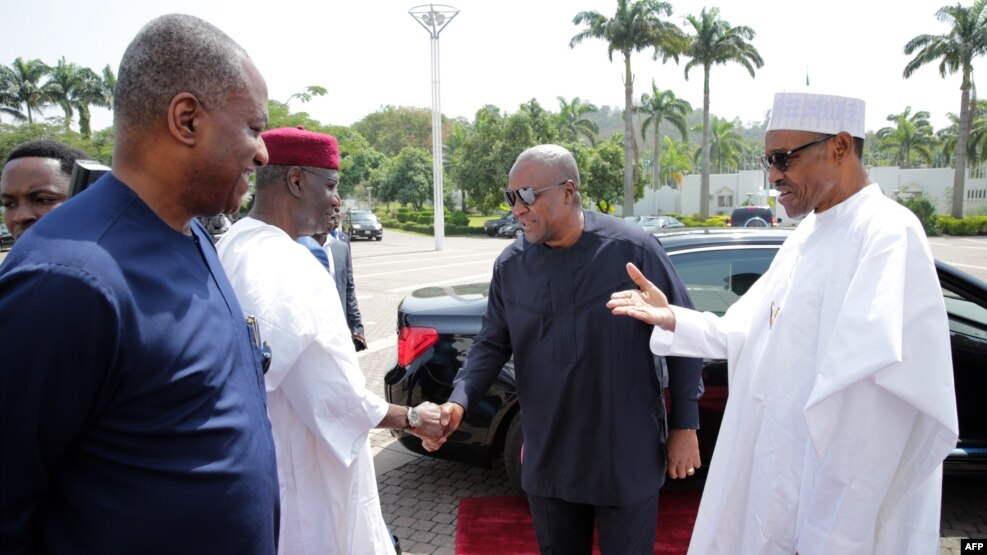
President of Nigeria Muhammadu Buhari (R) greets former President of Ghana John Mahama (2nd R) in Abuja on Jan. 9, 2017.
Nigerian President Muhammadu Buhari headed up a delegation to Gambia Friday to offer President Yahya Jammeh asylum if he steps down to allow for a peaceful transfer of power following last month's election.
Jammeh, who has ruled the tiny West African country for 22 years, was declared the loser in Gambia’s December 1 election. His government was accused of numerous rights abuses during his time in office, including arbitrary arrests, torture, and forced disappearances.
The U.S. State Department Human Rights report said “officials routinely used various methods of intimidation to retain power.”
Opposition candidate Adama Barrow, who was declared the winner in the election, said he will continue to plan his inauguration for January 19.
Initially, Jammeh accepted the results, but his political party filed a legal complaint against the electoral commission about a week later, citing voting irregularities.
The Associated Press reports that Gambia's Supreme Court might not be able to hear the challenge until May because it is short of judges. Jammeh wants to wait for the court's decision, according to the AP.
The head of the electoral commission fled to neighboring Senegal after Jammeh accused him in his New Year’s address of falsifying results. Jammeh said no one would cheat him. It was seen as a veiled threat.
Earlier this month, Gambia's army chief reaffirmed his support for Jammeh in a letter published in a pro-government newspaper.
The United Nations and several other African leaders have asked Jammeh to step down peacefully.
West African regional bloc ECOWAS has placed its military force on standby if Jammeh does not step down next week.
Speaking of the ECOWAS high-level mission to Banjul, the head of the U.N.’s office for West Africa and the Sahel, Mohamed Ibn Chambas, Friday told the Security Council that “they plan to leave no doubt about the determination of ECOWAS to use all necessary means, including force, to have the will of the Gambian people upheld.”
“Should this be deemed necessary,” Ibn Chambas continued, “ECOWAS intends to seek the endorsement of the AU Peace and Security Council and the formal approval of this council to deploy troops to the Gambia.”
International military historian at the University Félix Houphouët-Boigny in Abidjan, Arthur Banga, says the Gambian military would likely be no match for ECOWAS forces.
Comments